South Australia’s dumpster divers driven by rising living costs and war on waste
TOO many people are drawn to the risky venture of dumpster diving out of desperation. But this deeply disturbing phenomenon is also drawing South Australian professionals with increasing regularity, as this special report reveals.
SA News
Don't miss out on the headlines from SA News. Followed categories will be added to My News.
READ BELOW:
Special report: The food waste warriors
My nights out watching desperate dumpster divers
- OUR SPECIAL COST OF LIVING SERIES
- FEES: The bills that will hurt - and some that wont
MORE and more South Australians are being driven by poverty to scavenge at night for discarded food in supermarket dumpsters, while others are trying to save the planet from needless waste, a Sunday Mail investigation has found.
The unemployed, underemployed, single parents, university students, pensioners, low-income working families, and young professionals with an environmental conscience are regularly engaging in dumpster diving.
This is despite the health risks of contaminated food from bacteria and chemicals, including bleach-soaked food possibly to deter pilfering.
There are also safety risks associated with poorly lit locations, confrontations with security and, although unlikely, charges of theft and potential civil trespass.
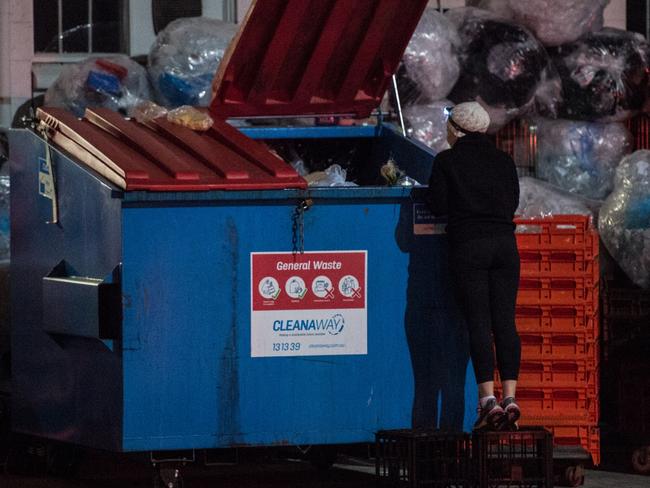
“Sadly we hear increasingly personal testimonies from people — often in tears — who have felt so desperate they have gone digging through bins in search of food,” South Australian Council of Social Service chief executive Ross Womersley said.
“There is no doubt that this arises essentially because people simply don’t have the income to meet all their expenses no matter how frugal they might be trying to be.”
Christine, who’s been dumpster diving for three years, lives off $300 a week from casual work and the Newstart allowance but says it barely covers the rent and bills.
“I just wouldn’t be able to afford to eat without it,” said the 50-year-old from Enfield.
Bronwyn, 23, from Adelaide’s inner-south, said: “I started doing it to reduce waste — I was horrified at how much was going to waste.”
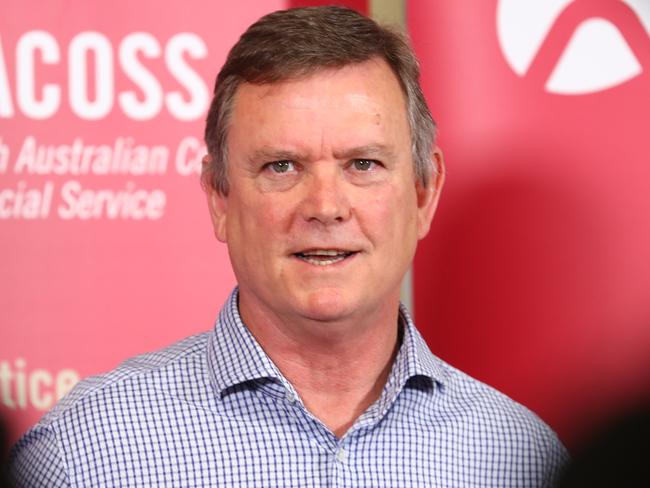
She is part of a growing social media network of about 1900 South Australians who regularly dumpster dive. She said her Facebook page shared tips on how to dive safely and help redistribute excess food to those most in need.
“It’s everyone from uni students to people in their 60s,” she said. Bronwyn said more needed to be done to divert food headed to the dump to those in need, adding: “I see a lot of families doing it rough in the western suburbs.”
Coles, Woolworths, Aldi, IGA and smaller independent grocers across SA are diverting tonnes of surplus food each year to SA charities through organisations such as OzHarvest, Foodbank and Second Bite.
Foodbank SA chief executive Greg Pattinson said 102,718 south australians accessed food from 790 charities, schools and childcare centres supplied by the organisation each month — up 21 per cent from the previous year.
“The rising demand is mainly to do with electricity prices — people can’t afford to heat their homes and eat at the same time,” he said.
All supermarkets contacted by the Sunday Mail discouraged dumpster diving due to health and safety risks involved.
“It’s much safer for us to partner with hunger-relief agencies so they can get edible surplus food to those in need and that’s what we’re working to do more of,” Woolworths head of sustainability Adrian Cullen said. An Aldi Australia spokeswoman said products were reduced a week before their “display until” date and donated to charity if not sold.
“We will only discard products should they be unsuitable for use or consumption,” she said. “In some instances, we lock waste containers to avoid vandalism or theft.”
SPECIAL REPORT
THE FOOD WASTE WARRIORS
By Rebecca DiGirolamo
CAUGHT in car headlights, she runs through a southern suburbs supermarket carpark carrying an empty crate. It’s around 8pm on a Sunday night, and the single mum-of-three is hoping to trawl though the supermarket’s massive garbage skip bins, or dumpsters, for edible food.
“I do it to make ends meet,” she says. It’s her second time “dumpster-diving” and she’s been spooked by an older man in the huge bin filling a laundry basket with fruit, vegetables and milk.
She retreats empty-handed to her car — where her sons aged under eight patiently wait in their pyjamas, oblivious to their mother’s plight.
“I went last week for the first time with a friend but she couldn’t come tonight and I couldn’t wait,” she says.
“I needed to come out on my own — I’ve been really scared.”
She is among a growing group of South Australians on the poverty line hand-picking bruised or imperfect fruit and vegetables, day-old bread no longer fresh enough to sell, and food close to the recommended “best before” date — sometimes with weeks and months to go before expiry — that’s damaged stock, or surplus and needs to make way for a new batch on the shelves.
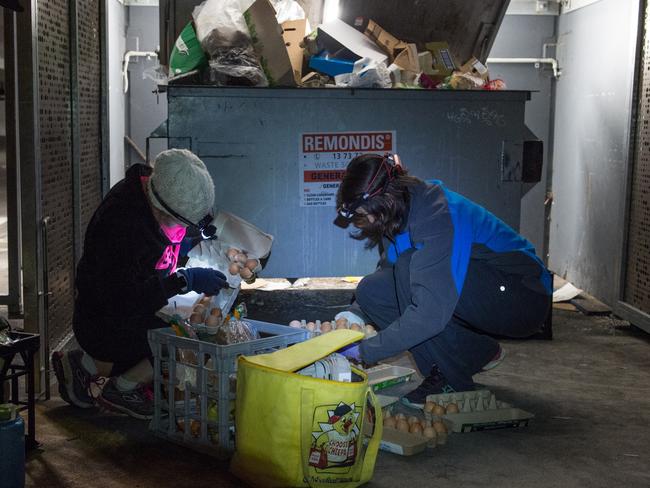
The Sunday Mail’s investigation into dumpster diving among those risking their health to make ends meet reveals a sad reality. Food is going to waste despite growing efforts by governments, supermarkets and food rescue groups. Twice in the past month, the Sunday Mail has observed and met dumpster-divers loading car boots with groceries from dirty bins in supermarket carparks all across Adelaide.
“The first time I went diving I was amazed by the amount of bread I found — this is really nice bread,” says Christine. She’s a regular diver who is underemployed and supplements her supermarket trolley of pricey meat and cleaning products with dumpster-dived fruit, veg, bread, and dairy.
Christine says she feels more dignified dumpster diving than returning time and again to charities for food handouts.
“I feel no shame dumpster diving,” she says. “The shame should be on supermarkets who throw all this good food away.”
While she hasn’t been ill from any of the retrieved food, she says there are risks with food being contaminated or spoiled by staff trying to stop the practice.
Another regular diver says: “A lot of places are putting bleach all over the food to stop dumpster diving.”
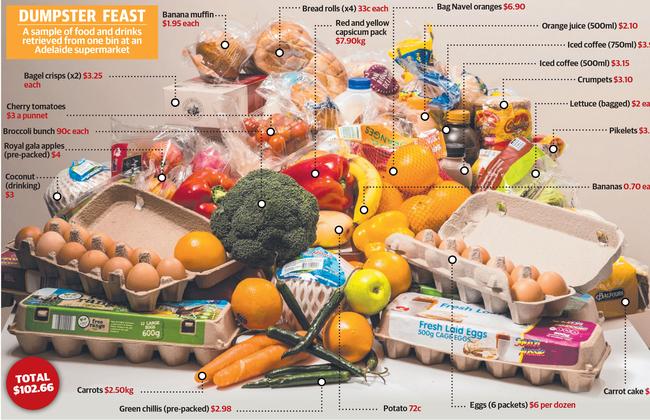
She says she does it to raise awareness of Australia’s $20 billion annual food waste bill and to reduce the environmental effects on landfill. She is part of a local social media network of 1900 followers who share tips on how and where to dumpster dive in SA and who also redistribute excess food hauls among themselves and to those in need.
“There are definitely dumpster- divers who do it for environmental reasons, but I think the majority are doing it because they are struggling financially,” she says.
Burnside Council resident Jan started dumpster-diving a few years ago to feed her chooks discarded bread and soon discovered among the scraps a plentiful bounty of food worthy of the dinner plate.
“I definitely don’t do it because of the money,” she says. “I just hate to see waste and I see the damage done to the environment in order to produce this food. It requires energy that produces carbon to make and transport this food.”
Miffy, a 28-year-old teacher, has been dumpster diving for the past year after watching a documentary on food waste.
“I just can’t stand to see the waste. It’s so sad and there’s no attempt made to dispose of this food ethically.”
With her garden gloves, head lamp and empty crates, she dives weekly — always with a friend — at several supermarket sites across Adelaide’s east, west and southern suburbs.
“There’s nothing wrong with this food,” she says. “There may be a dent in the can, or the milk might have four days left and they have a new batch ready to be sold.”
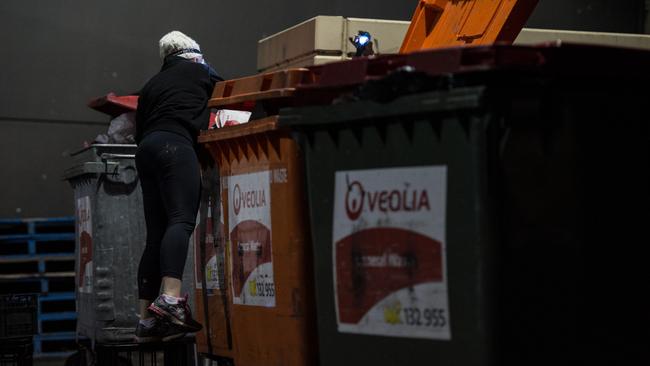
Her regular diving hauls include bruised bananas, fresh broccoli and leeks, bags of oranges and apples thrown out because of one rotted fruit, partially damaged cartons of eggs, dented bottles of low-fat and flavoured milk, and loads of day-old baked goods, including bread, Vegemite scrolls, pizzas, pikelets, muffins and finger buns.
She stays away from meat and only takes dairy if it’s cold to touch.
A zero waste advocate, Miffy says food retailers are not doing enough to dispose of waste ethically. She says waste recycling is inconsistent among Adelaide supermarkets, saying they should be using dedicated organic waste bins for recycling into compost rather than simply dumping it all in general waste bins.
Miffy also says more needs to be done to ensure good food is diverted to the needy rather than needlessly sent to landfill, in turn polluting the environment.
In the past year, food recovery groups Food bank and OzHarvest have collectively rescued more than 3000 tonnes of food otherwise headed to landfill from supermarkets across SA.
OzHarvest founder and CEO Ronni Kahn says he was shocked to witness first-hand the amount of edible food in bins during the 2015 filming of independent documentary Food Fighter, and had since been working with more than 3000 businesses across the country, including supermarket partners such as Woolworths, to achieve their goal of zero waste to landfill by 2020.
“But there is still much to improve,” he says. “Dumpster-diving is a sad reflection that good food is still needlessly going to waste.”
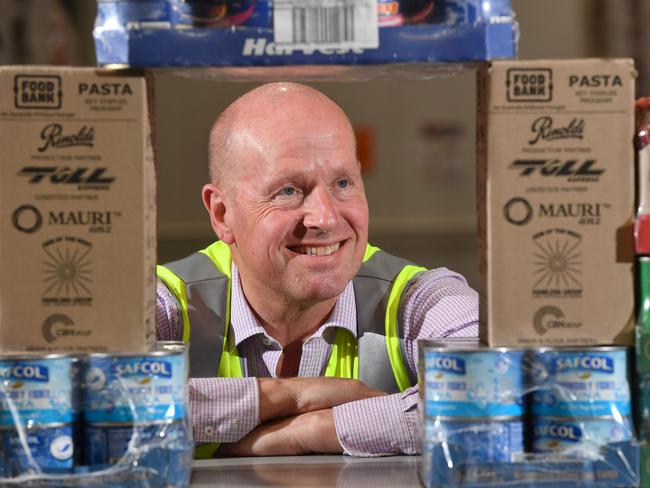
Foodbank SA CEO Greg Pattinson says food recovery in the state needs to jump 2000 tonnes a year in order to meet ever-growing demand from charities. The organisation runs five food hubs across SA, where people referred by charities can shop for surplus food from farmers, manufacturers and retailers.
“Some of the food we collect would otherwise be going to landfill — products approaching best-before dates and generally food left over at the end of the day that can’t be sold,” Mr Pattinson says.
He agrees, though, that gaps might still occur in the food-recovery system. He says sometimes, heavily discounted food — such as bread — not sold until the last minute might not be donated in time and ends up in the bin.
“Rather than dumping the food, a food relief corner could be set up in store or nearby and people could collect the food rather than diving into a dumpster,” he says.
He also says the nation’s ever-mounting food-waste bill was a shared problem among producers, manufacturers, retailers and consumers and requires a different way of production and consumption.
“We take food wastage seriously,” a Coles spokeswoman says, adding that customers are now demanding active reduction of waste to landfill through recycling and finding alternative uses for waste.
She says almost all of SA’s 56 Coles stores are donating excess food for community food programs such as the Salvation Army’s Market Place.
Woolworths says it has donated the equivalent of 10,000 meals each week to SA food recovery groups over the past 12 months.
“We know there’s much more we can do which is why we’ve committed to have food-waste diversion partners in place at each and every store across Australia by the end of this year,” Woolworths head of sustainability Adrian Cullen says.
Aldi Australia says it is working to reduce food wastage all the way back to the farm and aims to “ensure that very few products on our shelves end up as waste” by donating up to 3175 tonnes of surplus groceries to those in need each year.
Meanwhile, as governments, food industry, charities and consumers catch up to the reality that good food is going to waste while South Australians are going hungry, people like the mum-of-three from Adelaide’s south will keep diving through dumpsters despite the risks and the indignity.
MY NIGHTS OUT WATCHING DESPERATE DUMPSTER-DIVERS
By Rebecca DiGirolamo
IT REALLY stinks. It’s cold, dark, dirty and I’m really anxious over the possibility of a chance encounter with security guards.
My dumpster buddy’s wearing dark clothes and thick gloves to protect against bacteria, chemical contaminants, rodents and anything sharp. This is — after all — garbage.
It’s my second time out observing dumpster-diving. Three weeks ago, I had no idea it existed, and then ignorantly assumed it was driven by greenies wanting to save the world one trash can at a time.
My dumpster-diving guide started sifting through supermarket, fruit and vegie store, and petrol station tip-bins after watching a documentary on global food waste a year ago.
So off we go. She opens the massive dumpster lid with a bang. She says not to worry, adding we’d have to leave if asked by security or face the threat of trespassing.
She’s adamant she’s not stealing because the food has been thrown out. It’s a grey area, though — legal advice suggests those who recover discarded goods could still be at risk of breaking the law.
We push on, visiting several supermarkets across the metro area. About one in three of the bins are locked — some are in carparks or open-access loading bays. She tells me there is an etiquette to dumpster-diving — be respectful to fellow divers, leave when asked, and clean up after yourself.
She shows me her haul — loose apples, bananas, oranges, leeks, zucchinis, broccoli, onions, potatoes and capsicum. It’s all among the general waste of dirty rags, paper wipes and rotting food scraps headed for the dump. It looks fresh.
There’s packaged snacks — lunch-box-sized crisp breads and bars in a broken box with a best-before date of March 2019. There’s at least six trays of 1kg pork schnitzel with four days to go before expiry. She leaves the meat — it’s too risky to eat. There’s a big carton full of dozens of eggs that appears to have been dropped — she sifts through, removing the broken ones and taking the rest. The use-by date is July 27.
Very little of what she finds has been discounted for quick sale.
The biggest surprise was a massive dumpster that was filled with day-old bread. There were hundreds of loaves of all types of bread — sour dough, rolls, pizza pull-aparts, French sticks and Vegemite scrolls.
I’m angry. There’s a mum we met dumpster-diving who could have done with that food for her kids.
I get that there are times when store managers and staff have to get rid of rotten stock and food about to expire. But there’s food in these bins that is well within use-by dates.
The experience has been confronting on so many levels. I never imagined that there would be people — mums and dads — going through food waste bins to feed themselves and their families despite the risk to personal safety and the indignity.
And then there’s the needless waste. It’s such a shame. And it’s lazy. Sort the good food out of the waste, make a phone call and get charities to pick it up. The demand is there among the needy.


